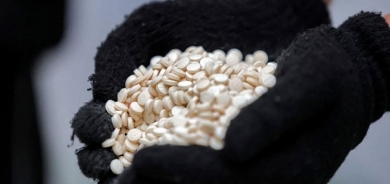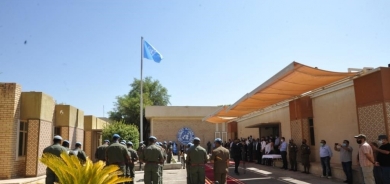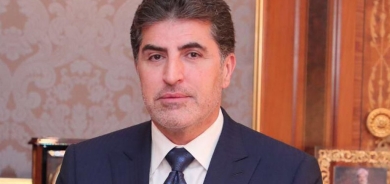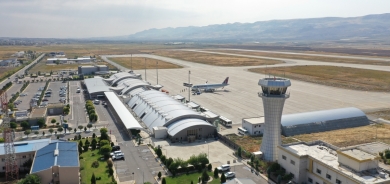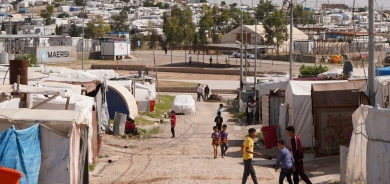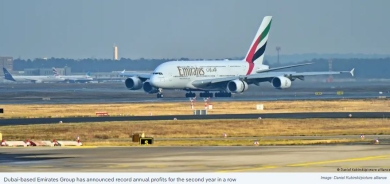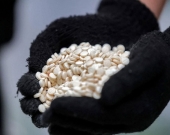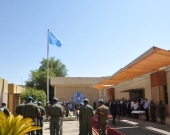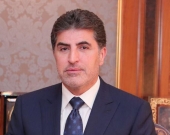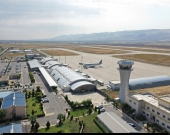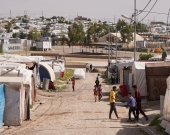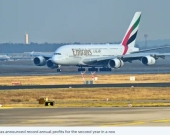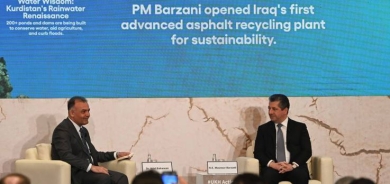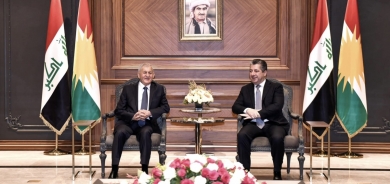Baltic states end Russian gas imports – but can the rest of Europe follow suit?
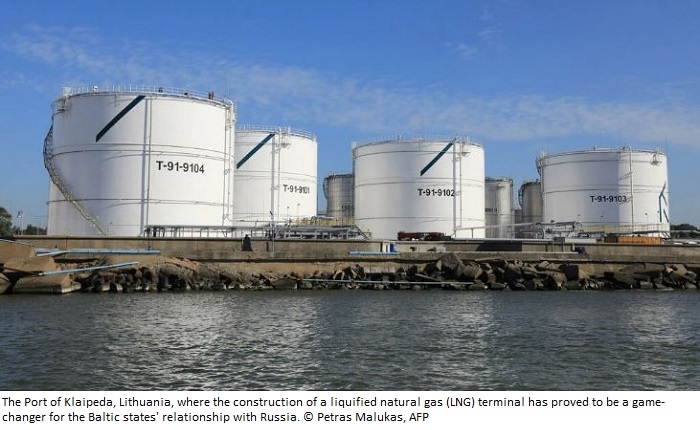
Global outrage over the gruesome killing of civilians in Ukraine's Bucha has heightened the pressure on Europe to halt its imports of Russian gas. Having led the way, Lithuania and its Baltic neighbours are urging their EU partners to join them in ending all purchases of Moscow’s “toxic” gas.
European leaders vowed on Monday to slap fresh sanctions on Russia following the discovery of a mass grave and tied bodies shot at close range in a northern suburb of Kyiv. But even as they recoiled in horror at the images coming from Bucha, they looked unlikely to agree to unwind the lucrative energy imports that critics say are financing Russia’s invasion of Ukraine.
Lithuania, meanwhile, has done just that – announcing at the weekend that it was ending all imports of Russian gas.
“From now on, Lithuania won’t be consuming a cubic cm of toxic Russian gas,” Ingrida Simonyte, the country’s prime minister, wrote on Twitter on Sunday, hailing her country as the first EU member “to refuse Russian gas imports”.
The announcement was celebrated as a milestone in achieving energy independence in the former Soviet republic of 2.8 million. It capped a remarkable turnaround for a country that imported almost all of its gas from Russia as recently as 2015.
“Years ago, my country made decisions that today allow us with no pain to break energy ties with the aggressor,” added Lithuania’s president, Gitanas Nauseda, in a separate post. “If we can do it, the rest of Europe can do it too!”
‘Independence’
Like its fellow Baltic states, Lithuania was once heavily reliant on Russian energy imports. But the situation has changed dramatically since 2014, when the country launched a liquid natural gas (LNG) terminal, aptly named “Independence”, in the port city of Klaipeda.
“We understood long ago that to be reliant on one source, namely [Russia’s] Gazprom, was too dangerous for us. So we bought this terminal as a kind of insurance policy,” said Zygimantas Mauricas, chief economist at the Vilnius-based financial institute, Luminor Lietuva, in an interview with FRANCE 24.
“It’s been a very successful investment,” he added. “Not only have we discontinued paying Russia. Now we also sell gas to our neighbours Latvia and Estonia; and from next month, we’ll be selling to Poland too.”
While Latvia and Estonia don’t have an LNG terminal of their own, discussions are under way to build one in partnership with Finland. In the meantime, the operator of Latvia’s natural gas storage facility has said they will rely on existing reserves to also halt imports from Russia.
Crucially, said Mauricas, Latvia has recently taken back control of its gas infrastructure, which used to be in Gazprom’s hands. As a result, it has enough reserves to ride out the rest of the year and can afford to break with Russia.
“The Baltic states realised early on that Russia was using energy as a political tool, we didn’t want to be pushed into a corner,” he said, noting that energy prices have been going up since long before the war in Ukraine. “Russia started the energy war last summer, I’m amazed how the leaders of Western Europe failed to see this earlier.”
Boomerang effect
The three Baltic states have been among the loudest voices urging Europe to end its dependence on Russian oil and gas. Last week, Lithuania’s Nauseda told his EU partners to stop buying Russian fuel “because the Kremlin regime uses this money to finance the destruction of Ukrainian cities and attacks on peaceful civilians”.
Russia supplies about 40% of Europe's gas needs. The share is even larger in countries like Germany, which has been convulsed by a debate over how to unwind a business relationship that is helping to finance the Kremlin’s war effort.
As pictures of the Bucha killings emerged on Sunday, Germany’s Defence Minister Christine Lambrecht broke a longstanding taboo in her country by stating that the EU must discuss banning the import of Russian gas – only to be contradicted by cabinet colleagues the next day.
Germany's Scholz vows new sanctions over Russian 'war crimes'
“The problem for Europe is always the same: how do we inflict pain on Russia without hurting ourselves,” said Nicolas Mazzucchi, a research fellow and energy special at the Fondation pour la recherche stratégique in Paris. “If you strike at the strategic heart of Europe’s economic partnership with Russia, then inevitably there is a boomerang effect.”
When it comes to halting Russian imports, the Baltic states have both an advantage and a headstart over the rest of Europe, Mazzucchi added.
“The Baltic states, as well as Poland, have been striving for many years to reduce their dependence on Russia, notably regarding gas supplies,” he told FRANCE 24. “The three Baltic states are also smaller and less populous than many other EU members, with very different consumer structures. We’re talking about a relatively small consumption of gas compared to the likes of France or Germany.”
Last month, EU leaders laid out a strategy that could cut reliance on this fuel source by two thirds within a year. "Even that target will be extremely hard to meet," said Mazzucchi.
“To supply the Baltic states, you need to find about 10 to 12 million cubic metres per year; it’s difficult but doable,” he said. “On the other hand, when the EU says it plans to reduce its imports of Russian gas by two thirds, that’s 100 billion cubic metres. It’s a whole different scale and a whole different economic and geopolitical problem. We don’t have 100 billion cubic metres that are readily available.”
By pipeline or boat
While there is no shortage of natural gas around the world, the trouble is getting it to Europe, either by pipeline or by boat.
One option would be to boost imports from Azerbaijan, “but that would mean widening the existing pipeline or building a new one", said Mazzucchi, noting that Azerbaijan’s production capacity is also much smaller than Russia’s. Pipelines carrying Algerian gas to southern Europe offer another option, “but one that is not ideal in terms of economic and geopolitical stability", he added.
Overall, Europe should beware of replacing its dependence on Russia with dependence on another supplier, Mazzucchi cautioned, adding that LNG shipments offer a better chance of spreading risk across a pool of suppliers. In the short term, however, such supplies are set to fall short of Europe’s vast demand.
The US has agreed to boost its shipments of liquified natural gas to Europe by 70%, aiming to supply 50 billion cubic metres per year until at least 2030. But that would still only be a third of what Europe imports from Russia, meaning other sources will be needed too.
“The EU can turn to eastern Mediterranean countries, like Cyprus, Israel and perhaps Egypt, but not all countries have available supplies or the capacity to liquefy the gas,” said Mazzucchi. He pointed to another obstacle in the limited number of gas tankers, which are almost exclusively built in Asia and take time to assemble.
The scarcity of immediately available resources means Europe will have to prove it can coordinate and share, said Ben McWilliams, a research analyst in climate and energy policy at the Bruegel Institute in Brussels, in an interview with FRANCE 24.
“LNG is the obvious solution, but as things stand it can only make up for about half the Russian gas, and that’s already stretching it,” he said. “We need coordination and solidarity in gas imports, ideally importing as a single bloc – as the European Commission is now trying to do – rather than having individual member states compete on the international markets and drive prices up.”
This will mean helping member states that have neither LNG terminals nor storage facilities, he said, as well as those like Austria that are heavily reliant on Russian gas and with no access to the sea.
Going green
According to Vilnius-based Mauricas, Europe also needs to be more careful in its choice of suppliers if it wishes to reduce its dependence on autocratic regimes. He said the West’s eagerness to shut down its own production capabilities while demand is still rising had left it at the mercy of autocrats – while bankrolling their regimes.
Europe’s scramble for alternatives to Russian gas and oil comes as the continent’s last extractors of fossil fuels are winding down their operations in an attempt to offset catastrophic global warming. But passing the buck is not a solution, Mauricas argued.
“Fossil fuels are no greener coming from Russia than they are coming from Norway. In fact, they are killing people in Ukraine, as we speak,” he said. “We need to import more energy sources from democratic regimes, which in turn need to step up supply while also investing heavily in renewables.”
That’s another field where Baltic states have been leading the way, added Mauricas, for whom Lithuania’s LNG terminal is “just one side of the coin – the other being a reduction in consumption”.
He pointed to the transformation of Lithuania’s central heating system, which “used to be gas-dominated and now runs at 80% on biofuel", noting that Estonia had made even greater progress. “Our low population density means there is plenty of space to develop wind farms and other renewable projects, both on land and at sea,” he added. It all makes economic sense too, with “gas prices likely to remain high in the near future".
“We shouldn’t be using gas to generate electricity, as some countries in Europe still do,” Mauricas said. “We should be using nuclear power, wind farms or even coal in the short term – particularly when you see what gas is paying for in Ukraine.”
A politically sensitive issue
Mazzucchi agreed that speeding up the transition to green energy sources is one viable option for countries, like Germany, that still rely on gas to generate electricity. There is also scope for European countries to make the storage, transport and distribution of gas across the block more efficient, he said, though cautioning that attempts to reduce household consumption will be a much harder sell.
“Politically it’s a highly sensitive issue,” he explained. “In France, for instance, gas is mainly used for cooking and heating. How do you tell people who just bought a gas cooker that they can’t use it anymore?”
Energy prices have emerged as the hot-button issue in the final stretch of France’s presidential campaign, with candidates rushing to promise subsidies and price caps. Widespread concern over the galloping inflation has played into the hands of far-right candidate Marine Le Pen, who opposed Western sanctions against Russia on the grounds that they would hurt French taxpayers too.
Curbing domestic consumption needs to be part of a coordinated strategy aimed at weaning European economies off their addiction to gas, said McWilliams.
“We need to pause production in certain industrial sectors, substitute gas on the electricity markets, and households now and over the next winter to be considerate with their heating,” he said, noting that the end of the cold season should help the continent replenish its reserves.
“If we’re really serious about solidarity with Ukraine and this course of sanction, then we’ve got to cut demand,” he added. “We need to see gas no longer as a cheap commodity but as a more precious one that needs to be managed more carefully.”
France 24

